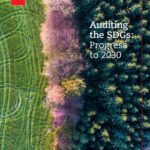Although Nike reached an agreement with Marc Kasky to end his lawsuit, the settlement’s effect on corporate social responsibility reporting remains to be seen.
Last Friday, Nike (ticker: NKE) and Marc Kasky settled the lawsuit that pitted the company’s claim of free speech rights against the social activist’s contention that commercial speech laws govern Nike’s statements about overseas sweatshops. In June, the US Supreme Court sent the case back to the California Supreme Court, which had ruled in favor of Mr. Kasky. By sending it back to California, the Supreme Court avoided making a judgment on the free speech issue.
"After five years, both sides have agreed that investing in factory worker programs and furthering collaboration on corporate reporting are far better uses of funds and energy than continued litigation," stated Maria Eitel, Nike vice president of corporate responsibility, and Jim Carter, Nike vice president and general counsel, in a letter to stakeholders.
The settlement stipulated that Nike donate $1.5 million over the next three years to the Fair Labor Association (FLA), an industry-sponsored nonprofit that promotes adherence to international labor standards and improved working conditions worldwide. FLA will use these funds to focus on three primary areas. These areas include improving independent monitoring in manufacturing countries, developing worker education and economic opportunity, and advancing a common global standard to measure and report on corporate responsibility performance.
"I understand why Nike would conclude that a donation of resources to promote accountability might be an elegant no-fault way out of the situation in which they have been placed," said Mallen Baker, development director for UK-based corporate social responsibility (CSR) advocate Business in the Community. "But the outcome is an unfortunate one."
"In the statement announcing the settlement, Nike said that it would continue to restrict its participation in the corporate accountability work it began with its first CSR report," Mr. Baker told SocialFunds.com. "It will not issue its 2002 CSR report, and it will restrict public platform activities–there can be no clearer indication of the potential damage of leaving the legal points of this case unresolved."
Mr. Baker joins Nike in worrying that the settlement may have a "chilling effect" on CSR reporting and transparency, as companies guard against the risk created by disclosing their CSR performance.
"I think Nike is blowing the chilling effect out of proportion," said Adam Kanzer, general counsel and director of shareholder advocacy for Domini Social Investments. Domini filed an amicus (or "friend of the court") brief with the US Supreme Court in support of Mr. Kasky. "Look at Nike’s website–it still has information up about its labor practices, which baffles me."
"As this shows, I think companies will continue to tell their side of the story, as they have a real market reason for doing so: to attract capital and new consumers," Mr. Kanzer told SocialFunds.com. "None of that has changed because of this lawsuit, the companies just need to be more careful that what they say is accurate,"
Although Mr. Kanzer welcomes the settlement, he does express reservations about its terms.
"I have concerns about the money going to the FLA, as Nike was a founding member, and my understanding is that they have a significant influence over the FLA’s agenda," said Mr. Kanzer. "Part of the FLA money will go toward working on some generally acceptable reporting format on labor issues, which is good in some ways, but the GRI [Global Reporting Initiative] is already out there: it’s a great format, it’s got input from a wide range of stakeholders, and it’s not controlled by corporations."
"I would have preferred to see the money go to GRI to strengthen its labor component," Mr. Kanzer continued. "It would be a shame to divert resources and energy from GRI–I would encourage FLA to work with GRI on this."
However, GRI can only serve as a step toward solving the problems around CSR reporting, because it is voluntary.
"The problem with voluntary reporting is that you don’t have a level playing field," explained Mr. Kanzer. "If we could get corporations like Nike to acknowledge that they would have a lot less risk in CSR reporting if the SEC [Securities and Exchange Commission] gave clear guidance on what needs to be reported, it would level the playing field."
"The answer to the chilling effect is mandatory, comprehensive CSR reporting–if it’s mandatory, there is no chilling effect."
The Corporate Sunshine Working Group, which includes Domini as a member, recently convened a symposium for Senators to examine the benefits of considering corporate social and environmental performance to be material. The SEC currently only considers corporate financial performance as material and hence necessary to disclose in SEC filings.
"Nike is a strong advocate for a universally applied standard for corporate practices, and we are certainly interested in the concept of a reporting requirement applied generally," Nike’s Mr. Carter told SocialFunds.com. "However, it’s impossible for us to hypothesize in such general terms as to whether or not we’d embrace the current legislative proposals, however vague they might be, without having given them further scrutiny."



